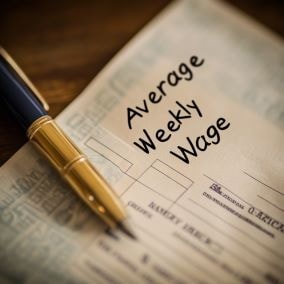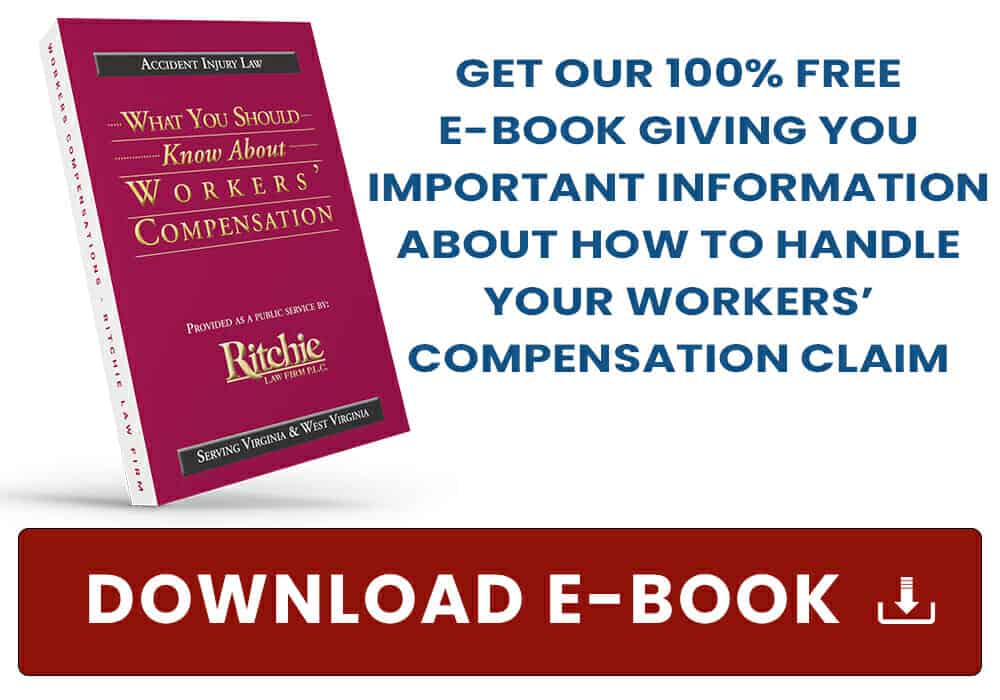How Do I Calculate Average Weekly Wage: Virginia Workers’ Compensation
Been injured on the job? Confused by all the legal terms and paperwork you need to complete after an on the job injury? Trying to figure out your Average Weekly Wage (AWW) and have no idea what you’re doing? Here is a little guidance on how to calculate Average Weekly Wage which may clear up some of the confusion.
In Virginia, an injured worker’s Average Weekly Wage is determined by his or her earnings on the job where the employee was working at the time of the injury. Average Weekly Wage, or AWW, is defined by Va. Code § 65.2-101 as “the earnings of an injured employee at the time of the injury.” The idea behind average weekly wage is that the AWW should closely approximate the money lost by the injured worker as a result of the injury. Reaching maximum medical improvement is significant in determining wage loss compensation under workers’ compensation laws.
Calculating Average Weekly Wage
To calculate average weekly wage, usually an injured workers’ earnings are added over the last year (52 weeks) and then that amount is averaged by 52 weeks. For example, say an injured worker makes varying amounts per week working at a convenience store. He might have some weeks where he earns $200.00, some with $250.00, and some with $275.00. You would add up the amounts for 52 weeks and then divide that answer by 52.
Say the total of those 52 weeks equals $12,575.00, then:
$12,575.00/52 = $241.83 Average Weekly Wage
Understanding how to calculate your AWW is crucial for determining your workers comp pay. For cases involving permanent partial disability, benefits are calculated based on pre-injury wages and a disability rating.
Factors That Influence Average Weekly Wage
Calculating your average weekly wage (AWW) is a crucial step in determining your workers’ compensation benefits in Virginia. Several factors can influence your AWW, including:
-
Your Earnings Over the 52 Weeks Prior to Your Injury or Illness: The most straightforward factor is your total earnings in the year leading up to your injury. This includes your regular wages and any other forms of compensation.
-
The Type of Employment You Had at the Time of the Injury: Whether you were a full-time, part-time, or seasonal worker can affect how your AWW is calculated.
-
Any Overtime, Bonuses, or Commissions You Received: These additional earnings can significantly impact your AWW, as they are included in the calculation.
-
Whether You Had Multiple Jobs or Employments at the Time of the Injury: If you worked more than one job, your earnings from all jobs may be combined to determine your AWW.
-
Any Fringe Benefits You Received: While fringe benefits like housing or meal allowances are not included in the AWW calculation, understanding their exclusion is important for an accurate calculation.
Understanding these factors can help you accurately calculate your AWW and ensure you receive the maximum workers’ compensation benefits you are entitled to.
What Happens If I Get A Promotion Before My Injury?
Say you’ve gotten a promotion just before your injury occurred. The Virginia Workers’ Compensation Commission says that when a worker receives a promotion just prior to an injury, the average weekly wage should reflect the higher salary to ensure accurate wage replacement benefits.
Can I Add Money From Side Work As An Independent Contractor In My Average Weekly Wage?
Suppose you are a painter and do painting jobs on the side as an independent contractor. Unfortunately, you are not able to add in income from this work when you determine your average weekly wage.
I Work Two Jobs That Are Similar But With Different Employers. How Does This Affect My Average Weekly Wage?
If you work two similar jobs, you may be entitled to have your wages from both jobs counted toward your average weekly wage. While no two jobs are exactly alike because one job may have some additional duties, this does not usually result in a refusal to combine the wages. Here is an example of how this works:
A police officer has a second job as a night security guard at a motel. He becomes injured while trying to arrest someone at the motel. In this situation, the Virginia Workers’ Compensation Commission has approved agreements where each employer pays its share of the injured workers’ wage loss benefits based on the combined wages. This can complicate your workers compensation claim, so it’s important to understand how your wages are calculated.
I Was Hurt At My Seasonal Employment. How Do I Calculate My Average Weekly Wage?
Calculating your average weekly wage (AWW) can be a bit more complex if you work seasonal employment. In Virginia, the Workers’ Compensation Commission considers your earnings from the 52 weeks prior to your injury to determine your AWW. However, if you have a seasonal job, you may not have worked for the entire 52-week period.
To calculate your AWW, you should include all earnings from your seasonal employment, including any overtime pay, bonuses, or commissions. If you have multiple seasonal jobs, you should combine the earnings from all jobs to determine your total earnings.
For example, let’s say you work as a seasonal lifeguard from May to September and earn $10,000 during that period. You also work as a part-time server from October to April and earn $8,000 during that period. To calculate your AWW, you would add your total earnings from both jobs ($10,000 + $8,000 = $18,000) and divide by the number of weeks you worked (26 weeks for the lifeguard job and 26 weeks for the server job, for a total of 52 weeks). Your AWW would be $346.15 per week.
When computing the average weekly wage of a seasonal worker, the Virginia Workers’ Compensation Commission will only average the number of weeks you actually worked at your seasonal job if you show that you remained in the labor market during the off season. Some people try to use seasonal work to supplement their Social Security checks and never plan to work more hours during the off season. In that instance, if you are injured during your seasonal work, the Virginia Workers’ Compensation Commission will compute the wage over the entire fifty-two week period. In some cases, seasonal workers may also be entitled to a minimum compensation rate.
It’s essential to consult with a Virginia workers’ compensation attorney to ensure you accurately calculate your AWW and receive the maximum benefits you’re entitled to.

What If There Is A Mistake In My Average Weekly Wage?
If it appears that a mistake was made when your average weekly wage was calculated, the Virginia Workers’ Compensation Commission has the power to amend the AWW. The Commission can set aside an award of Average Weekly Wage on the grounds of fraud, mistake, or imposition as per the Virginia Workers Compensation Act.
Can I Count My Fringe Benefits In Calculating My Average Weekly Wage?
Because it is nearly impossible to calculate a dollar worth for fringe benefits, they are not included in the calculation of the average weekly wage. While fringe benefits are excluded in average weekly wage calculation, medical benefits are a crucial part of the total workers’ compensation package.
Determining Workers’ Compensation Benefits
Determining workers’ compensation benefits in Virginia involves several steps, including:
-
Calculating Your Average Weekly Wage (AWW): Your AWW is the foundation of your workers’ compensation benefits. It’s essential to calculate it accurately to ensure you receive the correct amount.
-
Determining the Type and Extent of Your Injury or Illness: The nature and severity of your injury or illness will affect the type and amount of benefits you receive.
-
Calculating Your Wage Loss Benefits Based on Your AWW and the Type of Disability You Have: Depending on whether you have a temporary or permanent disability, your wage loss benefits will be calculated differently.
-
Considering Any Medical Benefits You May Be Entitled To: In addition to wage loss benefits, you may also be entitled to medical benefits to cover the cost of your treatment.
-
Filing a Claim with the Virginia Workers’ Compensation Commission: To receive your benefits, you must file a claim with the VWC and provide all necessary documentation.
It’s essential to work with an experienced workers’ compensation attorney to ensure you receive the maximum benefits you are entitled to.
The Role of the Virginia Workers’ Compensation Commission
The Virginia Workers’ Compensation Commission (VWC) plays a crucial role in the workers’ compensation process. If you have a dispute with your employer or insurance carrier, the VWC can provide mediation and arbitration services to help resolve the issue. The VWC also offers a variety of educational programs and resources to help employers and employees understand the workers’ compensation process.
Maximizing Workers’ Compensation Benefits
Maximizing workers’ compensation benefits requires a thorough understanding of the workers’ compensation process and the laws that govern it. Here are some tips to help you maximize your benefits:
-
Accurately calculate your average weekly wage: Your AWW is the foundation of your workers’ compensation benefits. Make sure you accurately calculate your AWW to ensure you receive the maximum benefits you’re entitled to.
-
Keep detailed records: Keep detailed records of your medical treatment, including doctor’s appointments, prescriptions, and medical bills. This will help you document your injuries and support your claim.
-
Follow the claims process: Follow the claims process carefully, including filing your claim on time and providing all required documentation.
-
Consult with a Virginia workers’ compensation attorney: A Virginia workers’ compensation attorney can help you navigate the complex workers’ compensation process and ensure you receive the maximum benefits you’re entitled to.
By following these tips, you can maximize your workers’ compensation benefits and ensure you receive the support you need to recover from your injuries.
I Am In The National Guard. How Do I Calculate My Average Weekly Wage?
If you are a member of the National Guard, calculating your average weekly wage (AWW) for workers’ compensation purposes can be complex. Virginia Code Section 65.2-103 provides specific guidance on how to calculate AWW for National Guard members:
-
Your AWW Will Be Based on Your Earnings from Your Civilian Employment, Not Your Military Pay: This means that your military earnings are not considered in the calculation.
-
You Will Need to Provide Documentation of Your Civilian Earnings: This includes pay stubs, W-2 forms, and any other relevant financial documents.
-
Your AWW Will Be Calculated Based on Your Earnings Over the 52 Weeks Prior to Your Injury or Illness: Just like other workers, your AWW is determined by your earnings in the year leading up to your injury.
It’s essential to work with an experienced workers’ compensation attorney who understands the unique challenges of calculating AWW for National Guard members.
Calculating National Guard Average Weekly Wage
If you are in the National Guard, your average weekly wage is covered by the Virginia statute noted above. Members of the Virginia National Guard who are injured in the course of their duties are entitled to the maximum compensation rate regardless of the amount they made before the injury.
Talk To An Experienced Virginia Workers’ Compensation Lawyer
If you have questions about how to describe your work injury or any other questions about your Virginia Workers’ Comp claim, it is wise to contact a lawyer for some advice. A lawyer can help you understand and maximize your workers comp benefits.
If you’ve been injured on the job, it is helpful to talk to a lawyer who is experienced in workers’ compensation claims. At the Ritchie Law Firm, you can talk to us for FREE . . . NO STRINGS ATTACHED! We can give you advice on your claim before you make a decision that could damage your case. Check out our article on “How Much Does a Workers’ Comp Lawyer Cost” here.
At the Ritchie Law Firm, we have successfully handled thousands of workers’ compensation claims. We’ve seen injured workers who have trusted the insurance adjuster only to find out that their time to file the paperwork to protect their claim had expired.
Virginia Workers’ compensation is a complex system that can be very difficult to navigate. Be very careful to make certain that your rights are protected before you sign anything. Talking to our workers’ comp lawyers about your claim is free. If we take your case, we don’t get a fee unless we win your case. There is no risk to you to get some information about your case before you make any decision that might negatively affect its outcome.
Ritchie Law Firm
Don’t Get Hurt Twice!
You can talk to us for FREE – free consultation
Call today 540-388-0533, fill out the form below or
download our free e-book here
540-388-0533
Ritchie Law Firm serves injured workers in all of Virginia while helping clients in cities and surrounding areas of Harrisonburg, Charlottesville, Staunton, and Winchester. Check out case studies from some of the cases we’ve handled by clicking here.




